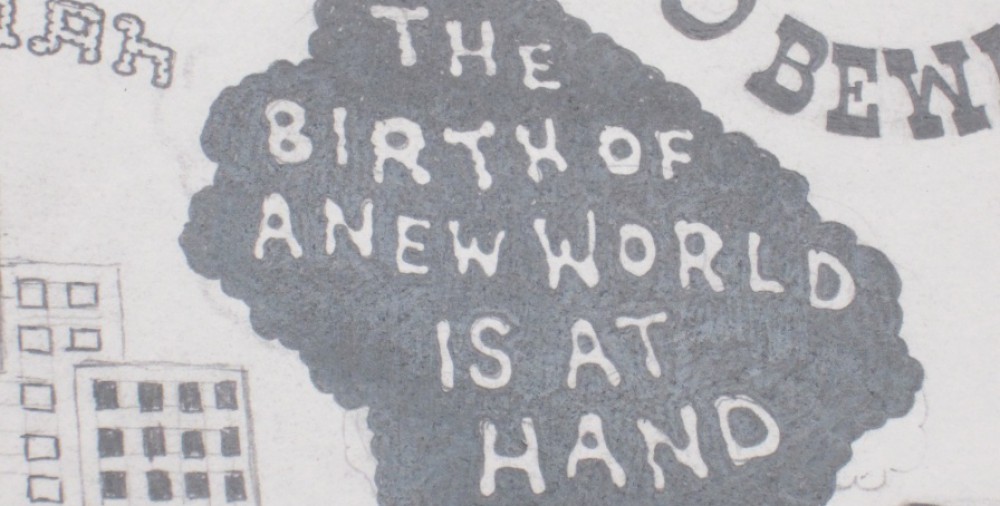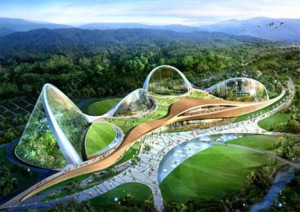Beginning “A Brave New World” the first and second pages immediately caught my attention. The story begins with the a sort of “walk-through” of the facility, including detailed descriptions of the attire and of the people working here – “The overalls of the workers were white, their hands gloved with a pale corpse-coloured rubber.” (15). We also get introduced to the first character which happens to be the Director of Hatcheries and Conditioning or D.H.C for short. This character walks around a group of students introducing the different areas of the facility and describes what is done in specific each area. I found it very interesting the way Huxley describes these areas in such a futuristic manner and so convincing; It made me believe that this place was actually real. This way of using the characters and create a situation in which it seems that the students are being shown around but in fact it is the reader that is being shown around the facility. I felt as if I was on that same tour, learning and being fascinated by this state-of-the-art “hatchery” as they call it. Learning about how they’ve managed to advance and improve the reproduction cycle using the “Bokanovsky’s Process” was remarkable. “One egg, one embryo, one adult- normality. But a bokanovskified egg will bud, will proliferate, will divide. From eight to ninety-six buds, and every bud will grow into a perfectly formed embryo, and every embryo into a full-sized adult. Making ninety-six human beings grow where only one grew before. Progress.” (17). I was thinking to myself if only this was something scientifically possible today! Reading along I start to get familiar with the several rooms and the exact purpose they served in the growth of these embryos. For example the “Decanting Room” was a dark room in which the embryos would develop according to their designated caste. Each embryo or caste group were set at a specific revolution and were given certain liquids/chemicals to enhance or discourage certain traits made for that specific caste. Which then brought me into recognizing the classes of caste this society had. Caste were named after the greek alphabet, these caste (Alpha, Beta, Gamma, Delta, & Epsilon) were in a hierarchy format. Alphas being the strongest, more attractive, and more intelligent. Down to epsilons which were seen as the lowest yet still usable for the dirty work. When these humans were being created designated a caste, they were already “predestined” by the facility. Meaning, as young embryos they were being programmed to be exactly what was needed. For example “But why do you want to keep an embryo below par?. . . . Hasn’t it occurred to you that an Epsilon embryo must have an Epsilon environment as well as an Epsilon heredity?. . .The lower the caste the…the shorter the oxygen” (24). This quote was in regards of how the facility creates a sort of retardation in Epsilons by shortening their oxygen supply just enough were they still can function proper; by function they mean work.
Aside from the hierarchy in mental and physical attributes, they were also segregated by clothing color: Alpha-Grey, Beta-Unknown, Gamma-Green, Delta-Khaki, & Epsilon-Black. To further separate the caste from each other they were conditioned through a recording instilling the desired moral values played during the child’s sleep; a technique used by the facility from an old story about a young polish boy that recalled things said from a radio station that was played on accident in his sleep. They realized this wasn’t useful for intellectual training but rather moral training.
After Huxley introduces us to the facility and the way things are created and why. He begins introducing us to more characters that carry on the story. We notice some relationships and interactions. My attention was brought to a character named Mustapha Mond. He is the “Resident Controller for Western Europe; One of the Ten World Controllers” (40). This character is shown a tremendous amount of respect from the time he enters the story, he also seems to know a lot of the history of Ford before it became what is shown today. In the first paragraph on page 41, Mustapha gives a major detail about knowledge of our (the reader) worlds history; everything from Bibles to Poetry. He also gives some insight on how parental figures used to be; During this, some students from the group felt sick. As if these ideas were so repulsive it made them sick to their stomachs to even think about it. Although we don’t know much of this character I feel he will definitely be our only connection to the past via the “Controllers”.
Some values of this society are exposed during the introduction of Mustapha Mond. For example “No pains have been spared to make your lives emotionally easy – to preserve you, so far as that is possible, from having emotions at all.” (49). From this quote I realized that the people were made in laboratories and raised exactly how they “The Controllers” wanted and providing them with everything they need to survive (stability) to prevent them from ever have emotional ties to anyone. This made it easy for them to concentrate on the work they were given to do. Another value is the “every one belongs to every one else” (48). This society believed in polygamy and were very open about sexual acts with one another, anything else was seen as abnormal. Many examples are shown throughout pages 46-49. Also seen, was that the society knew they they were all different in terms of the caste hierarchy but “All men are physico-chemically equal”(76) and even in death “even Epsilons perform indispensable services”(76)
Another character that caught my attention was Bernard Marx. Bernard is an Alpha, yet barely has the features of one. An example is shown in a conversation between Lenina and Fanny: “He’s so ugly!” said Fanny. “But I rather like his looks” “And then so small.” Fanny made a grimace; smallness was so horribly and typically low-caste.”. Also “Benard’s physique was hardly better then that of the average Gamma. He stood eight centimetres short of the standard Alpha height and was slender in proportion (69). Bernard knows he looks like an outsider “Contact with members of the lower castes always reminded him painfully of his physical inadequacy. . .his self-consciousness was acute and distressing. . .he felt humiliated” (69). This would cause him to isolate himself from every one. I also notice he is very defensive and thinks differently of people but does not show it. Although Bernard does not show rebellion against Ford, he does seem like he will be a troublesome character and may cause internal conflicts. An example of this is in his thoughts, overhearing a conversation about Lenina between Henry Foster and a coworker: “Talking about her as though she were a bit of meat.”. Bernard ground his teeth. “Have her here, have her there. Like mutton. Degrading her to so much mutton. . . “Oh, Ford, Ford, Ford.” He would have liked to go up to them and hit them in the face – hard, again and again. (51). What we do know is that what Bernard does not have in brawn he has in metal excess. As well as Bernard’s good friend Helmholtz Watson, another Alpha. Watson is a lecturer at the College of Emotional Engineering and is the prime example of an Alpha but yet is having trouble finding pleasure in the usual sports and communal activities.
I’m definitely eager to find out what happens in the upcoming chapters.




